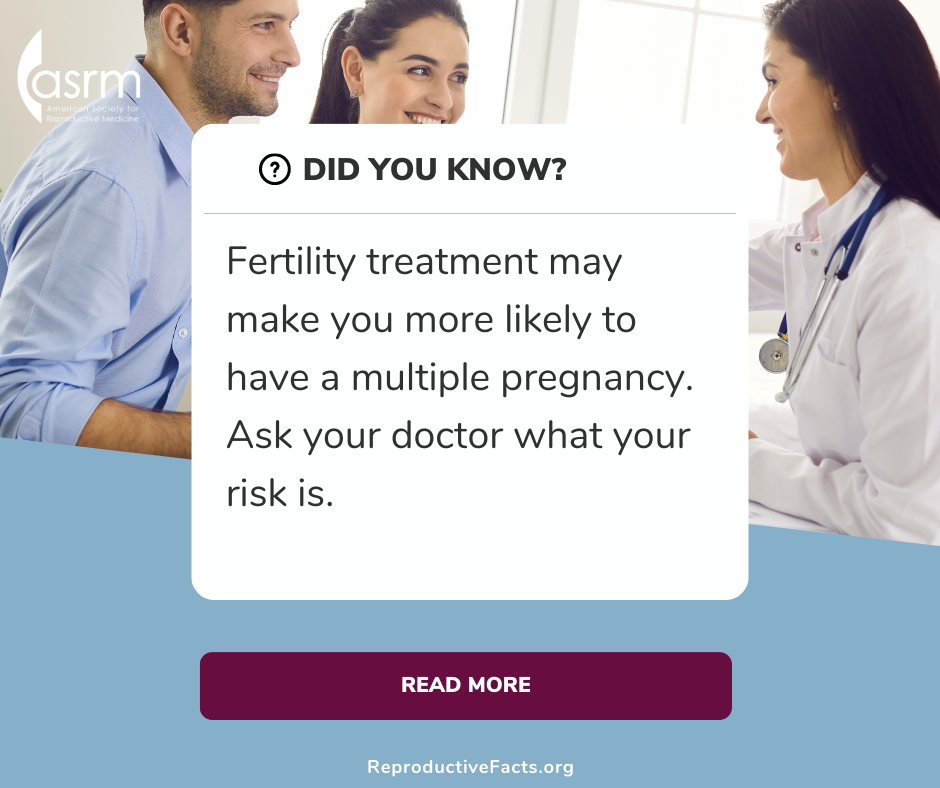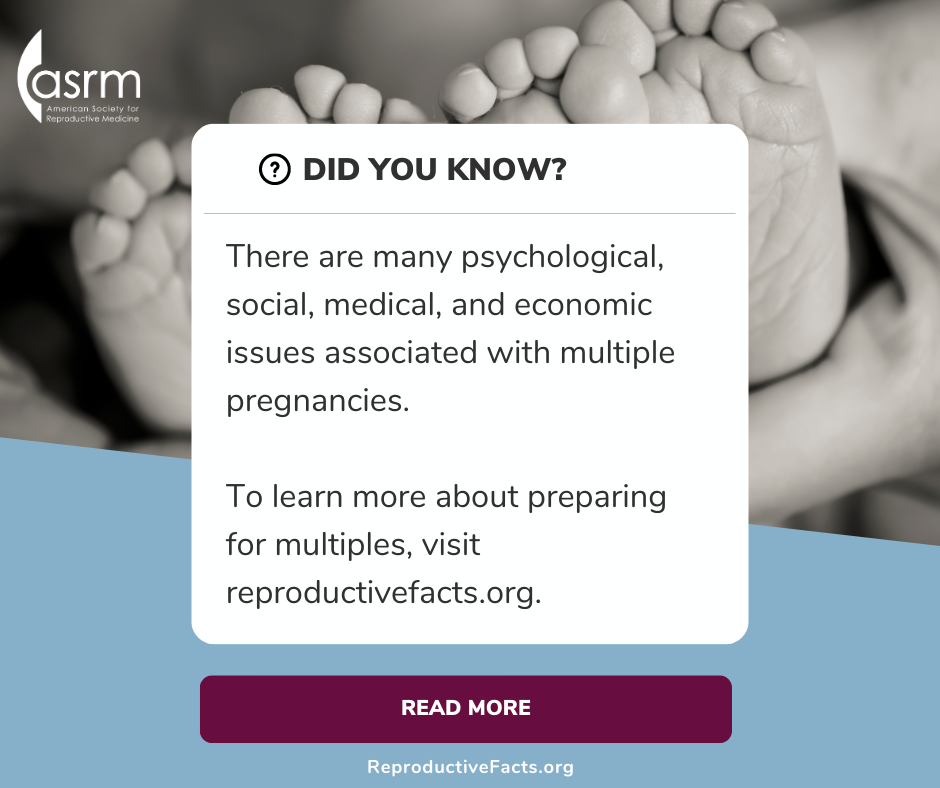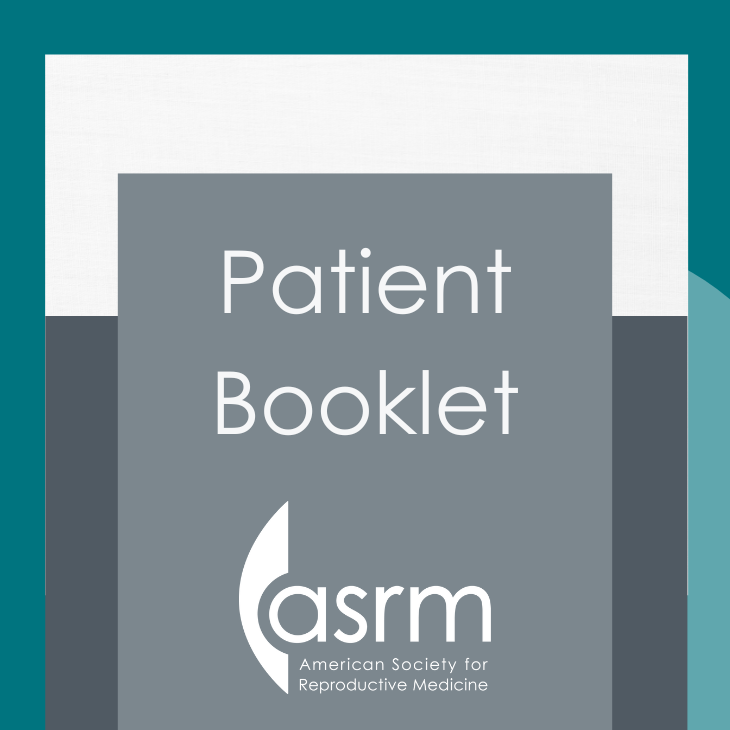Challenges of Parenting Multiples
Revised 2011
 There are many psychological, social, and economic issues associated with multiple pregnancies. These issues should be given the same amount of attention as the medical risks. Fertility treatment makes you more likely to have a multiple pregnancy. If you are currently pregnant with multiples (more than one baby), the issues discussed in this fact sheet will help you make informed decisions about your treatment. It will also prepare you for the unique challenges and rewards that come from parenting multiples.
There are many psychological, social, and economic issues associated with multiple pregnancies. These issues should be given the same amount of attention as the medical risks. Fertility treatment makes you more likely to have a multiple pregnancy. If you are currently pregnant with multiples (more than one baby), the issues discussed in this fact sheet will help you make informed decisions about your treatment. It will also prepare you for the unique challenges and rewards that come from parenting multiples. PSYCHOLOGICAL AND SOCIAL ISSUES
- Some multiples, especially newborns, may be hard to tell apart even if they are not identical. At first, you can tell multiples apart by color-coding their clothing or using bracelets that spell out their names. Soon you will be able to tell them apart by their individual characteristics and personalities.
- Parents may bond with multiples differently than with single-born children (singletons). During the first weeks, you may find yourself preferring one infant more than the others. Your “favorite” may vary from week to week as you get to know each one. Each infant will have different needs at different times, requiring differing amounts of attention.
- It is physically harder to take care of multiples than singletons. This is especially true when they are infants and toddlers. It may make the parents feel tired and stressed a lot of the time. Make sure to take some time for yourself and your partner as a couple, even if only for a few minutes a day. Remember to take care of yourself as well as your children.
- Older brothers and sisters may have a hard time getting used to the new babies. They will need you to pay attention to them too. Try to be sensitive to the needs of your older children. Involve them in the pregnancy by taking them with you to doctor visits. Ask them to help choose items for the nursery. Ask them to be your “helper” and ask for their opinions on taking care of the babies. This will help them feel needed and loved. Young children will need consistent one-on-one time with you, even if it is in short blocks.
- Some parents and schools prefer that multiples be in separate classes. This may help promote individuality. This is true particularly if the children have different abilities. But some schools may not have enough classes to separate multiples, and sending the children to different schools may not be possible. Contact your local school system to ask about their policies on separating multiples. You can also work with your children’s teachers to provide the best environment for your children.
- Parents of multiples may feel socially isolated. They may be tired, not have enough personal time, are too busy taking care of the children or are having money troubles. It is easy to become completely consumed in caring for multiples, but don’t abandon all of your hobbies and interests. Instead, look for ways to be creative in balancing your needs with those of your children.
 Multiples often attract attention. People may ask if you went through fertility treatment. This may have positive or negative consequences depending on the personalities of the parents and children and the nature of the attention. Plan ahead on how you will respond to this kind of attention and questions. Keeping a sense of humor is important.
Multiples often attract attention. People may ask if you went through fertility treatment. This may have positive or negative consequences depending on the personalities of the parents and children and the nature of the attention. Plan ahead on how you will respond to this kind of attention and questions. Keeping a sense of humor is important.- Help from family and friends is often short-term. Parents of multiples usually need additional help, even if one parent stays at home. Premature infants require smaller, more frequent feedings than full-term infants. It also requires a lot of time to feed them at night and change their diapers. You might need someone to help you at night until the babies have reasonable sleeping habits. If you can’t have someone in your home to help, work out a schedule so that each parent shares the work equally. Lack of sleep may cause fatigue and depression. Be aware of these signs in yourself or your partner. You should work as a team to overcome these difficulties. Postpartum depression (PPD) appears to be more likely in mothers of multiples. Depression can also occur in fathers. Recognizing the signs and symptoms of PPD and getting treatment are essential to the well-being of the mother and her infants.
- It might help to find support from organizations that are familiar with multiple births. Networking with parents who have had multiple births can also be helpful during difficult times.
ECONOMIC ISSUES
- The health care cost for delivery and newborn care for twins is four times higher when compared to a singleton birth. The increase is 12 times higher for triplets. Check your medical insurance to determine your out-of-pocket costs, if any, and plan ahead.
- Companies are not as willing to donate formula, diapers, etc., to parents of multiples as in the past. Because the number of multiples has increased, fewer families receive outside help today.
- The cost of caring for children with lifelong disabilities may be high. Some of your children may have a disability. If one does, you might want to look for government and private agencies or support groups in your area. They may be able to provide educational and financial assistance.
- The total cost of raising multiples is likely higher than the cost of raising the same number of singletons. Cribs, car seats, high chairs, and other items have to be bought all at once, which can be financially difficult. To save money, check with national retailers about discounts for multiples. Some stores give a 10% discount for twins, a 20% discount for triplets, etc. Also check with consignment shops. They often sell new and used children’s items at a fraction of the cost. Most multiple birth support groups have garage sales where families can buy clothing and equipment for multiples at low cost.
SUMMARY
Caring for multiples can be a challenge but it can also be rewarding. Try to join a support group and spend time with other parents of multiples to learn from their experiences. Ask your doctor about local and national support groups. Look for community resources in your area. The more information you have, the better prepared you will be.Fact Sheets/Booklets
View more fact sheets and booklets written by the ASRM Patient Education Committee.
Assisted Reproductive Technologies (booklet)
This booklet will help you understand in vitro fertilization (IVF) and other assisted reproductive technology (ART) that have become accepted medical treatments for infertility.
Hormonal Contraception
Hormonal contraceptives contain a progestin (progesterone medicine) with or without an estrogen.
What do I need to know about Zika virus and trying to have a baby?
Common symptoms include fever, rash, joint pain, conjunctivitis (red eyes), muscle pain, and headache.
Third-Party Reproduction
The phrase “third-party reproduction” refers to involving someone other than the individual or couple that plans to raise the child (intended parent[s]) in the process of reproduction.Multiple Births or Multiple Gestation
Find a Health Professional
Connect with reproductive medicine experts who will guide you through your unique journey. Our search tool allows personalized matches based on location, specialization, and expertise. Take control of your reproductive health with compassionate providers, innovative treatments, and unwavering support.
Search for an Expert











